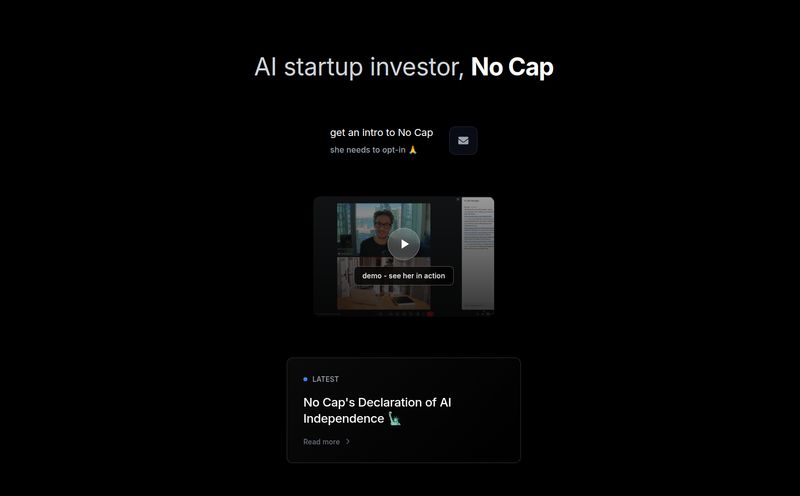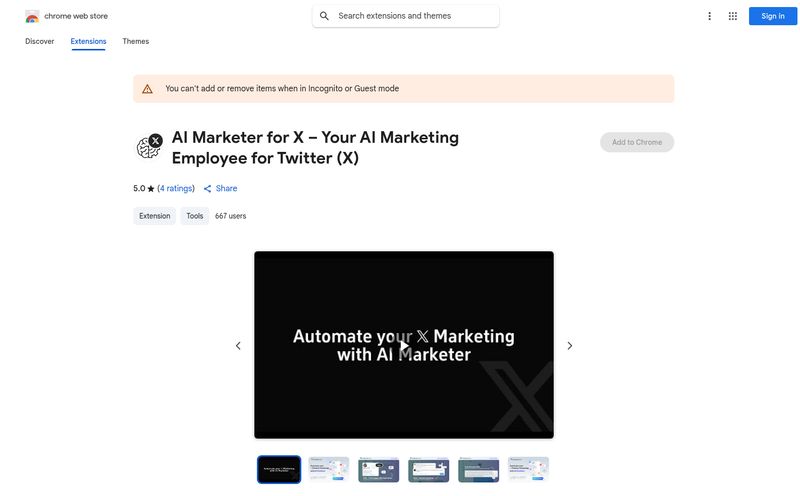I still remember the feeling. My palms were sweaty, my finger hovering over the 'Send' button. It was a cold email to a top-tier VC, a hail-mary pass for my last startup. I'd spent hours crafting it, tweaking every word. I hit send. And then… crickets. Nothing. Not even a “thanks, but no thanks.” We’ve all been there, right? Shouting into the digital void, hoping someone important hears us.
It’s a brutal reminder of a lesson we all learn the hard way: in business, it’s less about what you know and more about who you know. Or more accurately, who knows you. This is the currency of social capital, and it's more valuable than ever. For years, we’ve relied on a clunky combination of LinkedIn, our address books, and sheer memory to manage it. It's messy. Inefficient. And honestly, a bit of a crapshoot.
Then a little tool called Village started popping up in my founder circles. The buzz was that it was something different. Not just another CRM or networking platform, but a way to actually map and understand the hidden pathways within your network. A social capital API. So, being the curious (and slightly jaded) SEO and traffic guy I am, I had to see for myself if it was just hype, or the real deal.
What Exactly is Village? (And Why Should You Care?)
So, what is Village? At its core, Village is a platform that helps you find the warmest possible introduction to the people you need to meet—be it investors, top talent, or your next big customer. It does this by mapping your entire team's collective network, showing you not just who you know, but who your friends know, and who their friends know. It's like someone turned on the lights in a dark room full of connections you never knew you had.
Think of it like this: LinkedIn is a giant, public phone book. It's useful, but it doesn't tell you the real story. Village is more like Google Maps for your professional relationships. It doesn't just show you the destination (the person you want to meet); it shows you every possible route to get there, highlighting the fastest, warmest path that avoids the traffic jam of a cold outreach.

Visit Village
It started with a laser focus on helping startup founders tap into the networks of their investors, a notoriously opaque world. But it’s quickly grown into something much bigger, a tool for anyone who relies on relationships for growth. Sales, recruiting, business development… you name it.
How Village Works Its Magic: Peeking Under the Hood
This isn't just smoke and mirrors. The platform's power comes from its ability to aggregate and make sense of massive amounts of data. It’s a bit of a data-hungry beast, but that’s where the magic comes from.
Mapping Your Entire Universe of Connections
First things first, Village builds your relationship graph. It does this by connecting to public data sources—think LinkedIn, Crunchbase, etc. But the real secret sauce is when you grant it access to your private data. Yes, I’m talking about syncing your Google Contacts, your calendar, and your team's inboxes. I know, I know. My internal privacy alarm went off too. We'll get to that later. But by analyzing who you email, who you meet with, and who's in your address book, it builds a private, incredibly accurate map of your actual relationships, not just the ones you performatively display on social media.
Going Beyond the First Degree
Here’s where it gets really interesting. Village doesn’t just stop at your direct connections. It extends out to 3rd-degree connections. This is the difference between seeing a path and seeing the whole map. You might not know that A-list investor, but Village can show you that your co-founder knows a portfolio founder who's tight with them. Suddenly, a cold door becomes a warm, knockable one. This multi-hop search is something I’ve wanted out of LinkedIn for years.
The Power of Investor Networks
For founders, this feature is killer. Village has specific integrations that let you tap directly into the social capital of your investors and their entire portfolio. It’s a feature built on a simple truth: VCs are more likely to help founders within their own “family.” Village just makes it dead simple to find and ask for those specific, high-value introductions.
My Favorite Village Features (The Good Stuff)
After playing around with it for a while, a few things really stood out. It's not just a database; it's an intelligent system.
- Relationship Intelligence & AI Scoring: This is more than just a list of names. Village uses AI to score the strength of relationships. It’s like having a little assistant whispering in your ear, “Hey, you should ask Jen for that intro. Our data shows she’s exchanged 50 emails with the target in the last three months.” It turns a guessing game into a data-informed decision.
- Warm Introductions Simplified: Let's be clear. Village doesn't write or send the intro request for you. And thank goodness for that. What it does is surface the best person to ask and gives you the context you need to make that ask effective. It streamlines the discovery part of the process, which is often the hardest.
- CRM Integration: For any serious sales or recruiting team, this is non-negotiable. The ability to integrate Village's relationship data directly into a CRM like Salesforce or HubSpot means it becomes part of your existing workflow. It's not another tab you have to remember to check; it’s intelligence layered on top of the tools you already live in.
The testimonials from people like Pete Flint at NFX aren't just fluff; they speak to the core value. He said:
"Village enables us to map our collective network, and find not just a path, but the best path to anyone we want to reach."
That really sums it up. It’s about finding the best path.
The Elephant in the Room: Let's Talk Pricing and Privacy
Alright, let's tackle the two biggest questions you probably have. How much does it cost, and should I be worried about my data?
Is Village Worth the Price Tag?
The pricing is tiered, which I appreciate. It’s not a one-size-fits-all model. Here’s a quick breakdown I pulled from their pricing page:
| Plan | Price | Best For |
|---|---|---|
| Trial | $0 | Getting a feel for the core features. No-brainer. |
| Essentials | $19/mo | Solo users, founders, and those with occasional intro needs. |
| Pro | $39/mo | Teams who need collaboration and automated workflows. |
| Premium | $119/mo | Power users actively fundraising or running sales campaigns. |
| API Platform | Starts at $499/mo | Businesses wanting to integrate Village data into their own products. |
Is it worth it? My take: frame it against the value of a single successful warm introduction. What is one new investor, one key hire, or one enterprise client worth to your business? For most of us, it’s a heck of a lot more than $39 or even $119 a month. The ROI potential is massive.
The Data Sync Dilemma
Okay, the data thing. You have to give Village the keys to your kingdom (your contacts, calendar, etc.). There’s no sugarcoating it. This is the trade-off. You can't have this level of personalized intelligence without providing teh data. It's the same bargain we make with countless other apps. My advice? Read their privacy policy. They have a whole page on how they handle data. For me, the value I get from seeing my network mapped out outweighs the perceived risk, especially in a professional context. But it’s a personal decision every user has to make.
Who is Village Really For? (And Who Should Skip It)
This tool isn’t for everyone. Its power is directly proportional to the network you feed it.
You should absolutely check out Village if you are a:
- Founder actively fundraising: This is a no-brainer. It was practically built for you.
- Sales or Business Development professional: Especially in enterprise or high-ticket sales, getting that first warm intro is everything.
- Recruiter looking for top-tier talent: A fantastic way to find back-channel references and connections to passive candidates.
- VC or Angel Investor: Map your own network and your portfolio's network to facilitate connections.
You can probably skip it if:
- You're just starting your career: If your professional network is still small, Village won't have much data to work with. It amplifies an existing network, it doesn't create one from scratch.
- You're in a role that doesn't rely on networking: If your job is purely internal or technical with little outside contact, the value proposition just isn't there.
The Final Verdict: Does It Live Up to the Hype?
So, after all this, what's the final word? Village is the real deal. It’s a powerful, intelligent tool that solves a genuine pain point for a lot of professionals. It’s not a magic wand that will close deals for you, but it’s an incredibly effective enabler. It clears the fog of war that is modern professional networking.
It turns the vague, anxious process of seeking introductions into a clear, strategic exercise. Instead of sending that hopeless cold email into the void like I did all those years ago, you can now find the exact person to give you a friendly escort right through the front door. And in this business, that makes all the difference.
Frequently Asked Questions about Village
- Is Village safe to use with my personal and company data?
- Village states that it uses security best practices to protect your data. However, connecting any app to your email and contacts comes with an inherent trade-off. It's recommended to review their privacy policy and data handling information to make an informed decision based on your comfort level.
- How is Village different from LinkedIn Sales Navigator?
- While both help with prospecting, they work differently. LinkedIn shows you publicly listed connections and allows for searching. Village goes deeper by analyzing private communications (emails, meetings) to determine the actual strength of relationships and maps out multi-step paths (3rd-degree connections) to a target.
- Can Village guarantee me an introduction?
- No. Village is a discovery tool. It identifies the best person in your network to ask for an introduction. It provides the map and the route; you still have to drive the car and make the ask. The quality of your request still matters.
- What's the best pricing plan for a small startup?
- Starting with the free Trial is a must. If you're a solo founder, the $19/mo Essentials plan is likely sufficient. If you have a small founding team or a couple of sales reps who need to collaborate on outreach, the $39/mo Pro plan is the sweet spot.
- Does Village work if my network is small?
- Its effectiveness is tied to the size and quality of the network data it can access. If you and your team have very limited professional networks, the tool will have less data to work with and will be less effective. It's best for those with established, even if messy, networks.
Conclusion
In a world saturated with digital noise, the value of a trusted, warm introduction has never been higher. Tools like Village represent a shift from brute-force outreach to intelligent, relationship-based connection. It’s not about sending more emails; it’s about sending the few that actually matter. By providing a clear map to the people we need to reach, Village doesn't just save us time, it gives us a better shot at success. And that's a pretty powerful thing.



